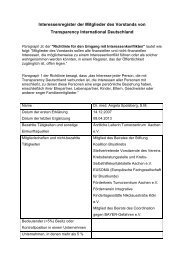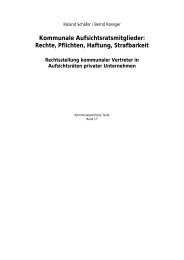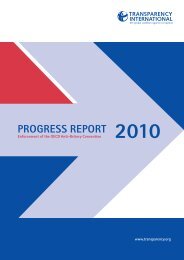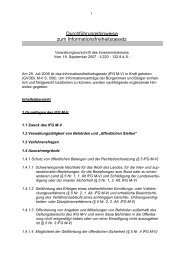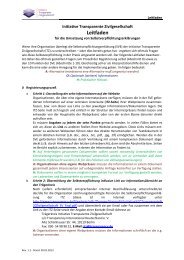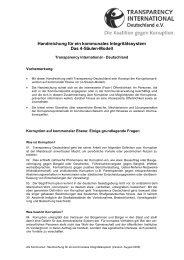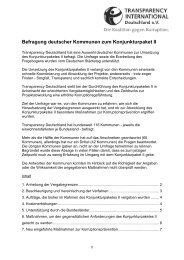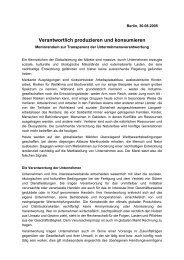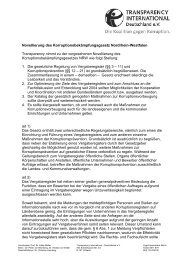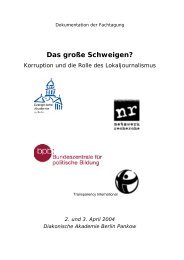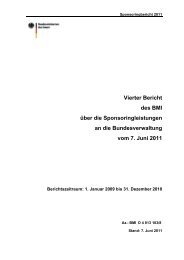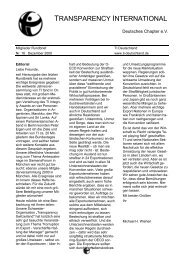Transparency International Germany - European Commission
Transparency International Germany - European Commission
Transparency International Germany - European Commission
You also want an ePaper? Increase the reach of your titles
YUMPU automatically turns print PDFs into web optimized ePapers that Google loves.
Vorsitzende: Prof. Dr. Edda Müller<br />
Stellv.: Dr. Peter von Blomberg, Dr. Hedda von Wedel<br />
Geschäftsführer: Dr. Christian Humborg<br />
– 3 –<br />
Civil society organisations hold an important position in monitoring and assessing government anticorruption<br />
activities, policy implementation (at all levels) and possible abuses of power, with a view to<br />
sustaining a culture of transparency and public participation within the <strong>European</strong> Union.<br />
Civil society organisations in EU member states have acquired vast expertise in many public areas<br />
related to the fight against corruption. If such a reporting mechanism was to be established, civil<br />
society would lend its general support to assess the implementation of the EU anti-corruption<br />
recommendations and work as professional anti-corruption watch-dogs in their respective countries.<br />
Question 2: Would you support other measures to be proposed at EU level?<br />
The proposed EU reporting evaluation mechanism should merely be seen as first step to fight and<br />
prevent corruption both within the EU and in its external action. At this stage, there is no common EU<br />
policy against corruption! There is no coherent set of policies for member states in the EU and<br />
external measures for third countries.<br />
TI strongly demands an urgently needed comprehensive EU-wide Anti-Corruption Strategy, which<br />
cuts across all relevant EU policy areas. This is justified since corruption is recognised as serious<br />
crime in the Lisbon Treaty (Art 83 TFEU). Apart from the effort to develop an anti-corruption package<br />
for EU member states (for both, the public as well as the private sector), the EU should continue to<br />
mainstream anti-corruption into for example its private sector policies (including the financial service<br />
reform), the climate change policy and its external action, since corruption is viewed as a major<br />
obstacle to achieving the EU development goals. In this context, corruption is a symptom of poor<br />
governance and of a lack of transparent, accountable management and control systems, especially<br />
the management of national resources (see 2006 Communication on “Governance in the <strong>European</strong><br />
consensus on Development).<br />
Moreover, the proven shortcomings in the transformation of international and regional anti-corruption<br />
legal instruments into domestic law should also be addressed by the EU. The bare minimum for EU<br />
anti-corruption action is, at least, a regular review of the implementation and, even more importantly,<br />
the enforcement of the existing EU anti-corruption instruments at member state level (e.g.<br />
Convention 1997, Council Framework Decision 2003 and the UNCAC which was not ratified by all EU<br />
member states).<br />
There is no need to re-invent the wheel and to loose precious time in the fight against corruption with<br />
the proposal to revert back to the debate on the definition of corruption. The EU is already State Party<br />
to the UNCAC since its ratification in November 2008 and is, thus, obliged to self-evaluate its<br />
anti-corruption policy, action and measures (UNCAC review mechanism). The UNCAC provides a<br />
concrete set of measures, which can be considered as entry points for the EU to prevent, criminalise<br />
and ultimately punish corruption and also raise awareness about the issue.<br />
To apply a holistic approach across the various policy areas and to implement a comprehensive EU<br />
anti-corruption strategy, the <strong>European</strong> <strong>Commission</strong> inter-service group on anti -corruption should<br />
be strengthened, following to which the results will consequently become of higher political<br />
importance. One of the mandates of the group could be to analyse and facilitate the mainstreaming of<br />
anti-corruption, transparency and integrity into the relevant EU policy areas, programmes and<br />
legislation.<br />
Civil society involvement is key in the implementation of anti-corruption action by government.<br />
Without a watchdog that monitors which promises are kept, only limited progress can be expected.<br />
Providing more financial means for awareness raising campaigns, the development of better anticorruption<br />
tools to gather data on corruption across and outside the EU or other anti-corruption<br />
projects would be desirable.<br />
Question 4: Which areas whether in public or private sector you consider as particularly vulnerable to<br />
corruption (e.g. politics, law enforcement, judiciary, health, education, public procurement including.<br />
spending of EU funds, business relations)<br />
Since March 2009, TI has recommended developing an assessment in three areas (i.e. public sector,<br />
private sector and judiciary) that are particularly vulnerable to corruption. Corruption risks and/ or lack<br />
of enforcement of existing anti-corruption laws and mechanisms in those areas are outlined below as<br />
a problem statement that is followed by relevant questions. The questions could form the basis of the<br />
<strong>Transparency</strong> <strong>International</strong> - Deutschland e.V.<br />
Alte Schönhauser Str. 44<br />
D-10119 Berlin<br />
HypoVereinsbank Berlin<br />
Konto 5611 679<br />
BLZ 100 208 90



